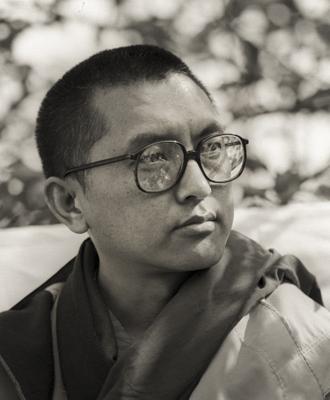Buddha said in the teachings, “Not creating any non-virtue, enjoying perfect virtue and subduing one’s own mind is the teaching of the Buddha.” This reveals the Four Noble Truths, the first teaching that Buddha gave at Sarnath for lower capable beings. If we don’t normally control our mind and we are always under the control of the dissatisfied mind—anger, the selfish attitude and the disturbing thoughts—if we are concerned all the time only for ourselves, if we are impatient and easily disturbed, then we experience many problems, confusion and disharmony every day.
If we think about the life of even one couple, without thinking about the whole world, we can see clearly what Buddha was saying. Even if we just watch our own mind, we can see that while we have anger there is no peace. If we remember past experiences in our life—those times when we had anger, a strong selfish attitude, pride or jealous mind—was there peace? Because of the dissatisfied mind, strong jealousy, ill-will or anger not only is the mind unhappy, but there is even physical pain, such as pain in the physical heart.
We can see even from a simple thing like this, how each day our happiness and peace of mind, or unhappiness, depends on our own mind in that hour, on that day. When we allow our mind to be under the control of disturbing thoughts there is no peace or happiness, but when we don’t allow this, there is peace and relaxation. If the mind is subdued and not under the control of disturbing thoughts, there is physical comfort, even if we don’t have the enjoyment of a luxurious place. When the mind is virtuous and has the nature of patience, there is great peace, relaxation and tranquillity. When the mind is under the control of anger, even if we live in an expensive apartment that costs thousands of dollars each day, if we eat luxurious foods which cost hundreds of thousands of dollars each day and spend thousands of dollars for clothes from the head down to the feet, if we don’t subdue our mind and take care of our mind, there is no peace or happiness in our life. Even if we are rich, our life is always lived in suffering and problems. Our mental suffering is greater than if we are beggars.
When the mind is in virtue, in the nature of loving kindness and compassion, there is great peace and contentment. Immediately there is an incredible realization of peace. When we have much suffering in the mind, it is not so much due to starvation and so on. Even if we find an apartment, we think about getting a better apartment. It is similar with things inside the house, for example, television: first we have one and after we have used it for some time we wish to get a better one. Similarly with cars. If we follow the selfish attitude it is always like this, without end. We want more and better things all the time. When we don’t get them, there is the worry of being unable to get them or of not having enough money.
The dissatisfied mind brings so many other problems, for example, fighting in the family and with friends over material things. This brings disharmony to a harmonious family or friendship. There is quarrelling, killing and much fear and worry. We feel a need for so many hundreds of things for the house, and even when we get old we are still not happy. The dissatisfied mind wants better things and more of them. This continues without end. As long as we don't stop this great disease, the dissatisfied mind, from our side the suffering continues all the time.
We need to check the mind while there is much confusion and the various problems which come from the dissatisfied mind not being happy, due to not getting better things and more of the things that we desire. If we simply think, “This is the dissatisfied mind and it has no end. As long as I follow this, it will never end. It’s not sure that I will live for a long time—another thirty or forty years—as the wrong conception of permanence believes. This thought that I will live long will continue until the moment death comes, therefore it cannot be trusted. Therefore, that’s enough for me. I get so many problems, because I follow the dissatisfied mind.”
If we think this, the pain caused by the dissatisfied mind is immediately pacified and there is great peace and liberation from problems. When the mind is satisfied, that is itself what is called “practicing Dharma.” The benefit of practicing Dharma is immediate peace.































